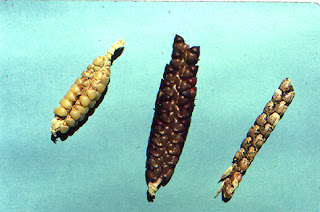Australian voters feel trapped into voting for candidates they may not
like in order to defeat others they like even less.
There are several forces at work that maintain this voting culture.
Fear of a
detestable outcome
Abbot vs Gillard, Gillard vs Rudd, Rudd vs Abott. It can often seem that
with our vote we are forced to choose between the better of two evils. The
Australian political spectrum is populated by wholly uninspiring leaders.
The compulsion to choose between the two likely political leaders is magnified when we the voters perceive either of the potential leaders to be absolutely detestable.
Notice how our major party candidates spend so much of their energy
convincing us to detest them. The Coalition’s social policies seem to be
designed to drive those who care about societal equality into the waiting arms
of Labor while Labor's economic intervention seems to be designed to drive free
market thinkers into the waiting arms of the Coalition. The policies of each
party are often as much about securing votes as about driving away those who
may not vote for them. Lines are drawn and the voters are pushed and pulled to
the two major parties.
In this manner, the two major parties actually support one another more
than they combat one another. Think about it; if both front-runners were
likable, Australians might feel more comfortable voting for some of the smaller
parties.
Wanting to ‘Win’
People often vote based on who they believe is the front runner because
they want to vote for 'a winner'. Since we want to influence the outcome, our
first thought is to differentiate between the two likely political leaders.
To the extent that there is a bandwagon effect for people to want to be
on the side of the winner, this means that polls assume an important role in
the decision-making process. This is compounded when the early perception is
based purely on previous elections, leading to a virtually unbreakable cycle. This
subverts our democracy, because as voters we should vote on the basis of
considering the issues and positions and not poll numbers alone.
During the 2003
election in Brazil, when presented with the statement, "I always vote for
the probable winner in an election", 13% of respondents said that they agree.
During the 1992
U.S. presidential election, Vicki G. Morwitz and Carol Pluzinski conducted a
study, which was published in The Journal of Consumer Research. At a large
northeastern university, some of 214 volunteer business students were given the
results of student and national polls indicating that Bill Clinton was in the
lead. Others were not exposed to the results of the polls. Several students who
had intended to vote for Bush changed their minds after seeing the poll results.
The bandwagon effect is
ultimately a barrier to the effective functioning of our democracy as it limits
the overall candidate pool to those likely to win.
Because as a society we
desire so much to be on the winning side of the election we choose not to vote
for the minor parties even if their policies are more in line with our
individual societal vision.
But
you will waste your vote!
This is one of my most hated arguments for not voting, or voting for a major party over a third party. This argument dismisses your democratic voice and establishes that anything other than a winning side vote is a ‘waste’. No person gets to be the arbiter of how your vote is used. It trivializes the individuals choice in the election outcome.
This is one of my most hated arguments for not voting, or voting for a major party over a third party. This argument dismisses your democratic voice and establishes that anything other than a winning side vote is a ‘waste’. No person gets to be the arbiter of how your vote is used. It trivializes the individuals choice in the election outcome.
There is no such thing
as throwing away your vote, your vote is yours and is a representation of your
individual place in socio-political community. You can vote for whomever you
want, you can go in and not vote and you can go in and write 'fuck you' on your
ballot.
None of this is wasting
your vote, it is your opportunity to be involved in the political process and
just because you don’t support either of the major parties or none at all does
not make your voice a ‘waste’.
note: in Australia political parties also get $2.50 per vote that they receive.








